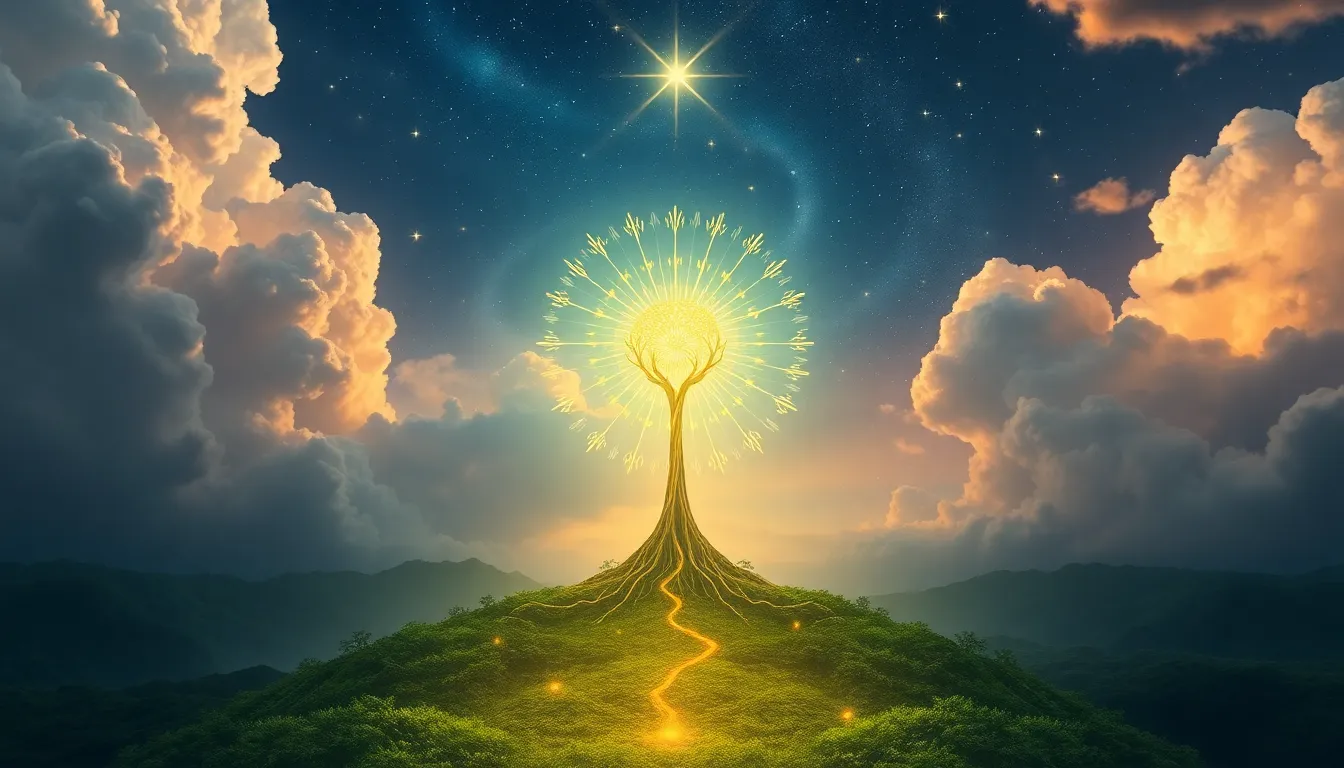The Cosmic Seeds: How Creation Myths Plant the Roots of Existence
1. Introduction: The Importance of Creation Myths
Creation myths are narratives that explain the origins of the universe, humanity, and the natural world. These stories serve as foundational elements in various cultures, providing insight into how different societies understand their existence and place in the cosmos. Through the ages, creation myths have been crucial in shaping beliefs, values, and identities, guiding human behavior and societal norms.
This article seeks to explore the significance of creation myths, specifically focusing on the metaphor of “cosmic seeds,” which symbolize the roots of existence. By examining ancient narratives, the relationship between nature and myth, and the psychological impact of these stories, we aim to uncover the enduring relevance of creation myths in modern society.
2. The Concept of Cosmic Seeds in Creation
The metaphor of “cosmic seeds” refers to the fundamental elements or ideas that give rise to existence. Just as seeds contain the potential for life, creation myths encapsulate the essence of beginnings and the forces that shape our reality. These myths symbolize the origins of existence and convey the interconnectedness of all life.
Creation myths often reflect the natural world, illustrating how human beings relate to their environment. They provide context for understanding the universe’s complexity and humanity’s role within it. By examining these narratives, we can better appreciate the intricate tapestry of existence and our place within it.
3. A Journey Through Time: Ancient Creation Myths
Throughout history, ancient civilizations have shared rich creation myths that reveal their understanding of the world. Here are key examples:
- Mesopotamian Creation: The Enuma Elish describes how the god Marduk defeated the primordial chaos, Tiamat, to create the world. This narrative emphasizes the triumph of order over chaos.
- Egyptian Creation: The Heliopolitan creation myth tells of the god Atum emerging from the primordial waters of Nun to create the world. This story highlights the importance of water as a source of life.
- Hindu Creation: The Rigveda presents various creation stories, including the cosmic being Purusha, whose sacrifice leads to the creation of the universe. This narrative reflects the interconnectedness of all beings.
Common themes in these early narratives include the battle between chaos and order, the significance of natural elements, and the cyclical nature of existence. These stories serve as a foundation for cultural identity and collective memory.
4. The Role of Nature in Creation Myths
Nature plays a pivotal role in many creation myths, often depicted as a character or catalyst in the narrative. The following natural elements are frequently emphasized:
- Earth: Symbolizing stability and nourishment, the earth is often portrayed as the foundation of life.
- Water: Representing creation and destruction, water is essential for life and often signifies beginnings.
- Fire: Associated with transformation and energy, fire can symbolize both creation and chaos.
- Air: Often linked to the divine and the breath of life, air represents the spirit and consciousness.
These elements not only shape the physical world but also influence the spiritual and cultural dimensions of existence. By examining how nature is portrayed in creation myths, we can gain insight into humanity’s relationship with the environment.
5. Cosmic Dualities: Chaos and Order
A recurring theme in creation myths is the tension between chaos and order. Many narratives depict a chaotic void or disorder before the establishment of the cosmos. Comparative analysis reveals fascinating insights:
- Greek Mythology: Theogony describes how Chaos existed before the gods brought order to the universe.
- Chinese Mythology: In the Daoist creation myth, Pangu emerges from the primordial chaos to separate yin and yang, establishing balance.
- Indigenous Narratives: Many Indigenous cultures emphasize the interplay of chaos and order, often portraying the earth as a living entity that undergoes constant transformation.
These dualities shape human understanding of existence, highlighting the struggles and triumphs inherent in the process of creation.
6. Creation Myths and Cultural Identity
Creation myths play a crucial role in forming cultural identity. They reflect societal values and beliefs, serving as a lens through which communities view their origins. For example:
- African Myths: Many African cultures emphasize communal creation, highlighting the importance of community and interconnectedness.
- Aboriginal Creation Stories: These narratives often center on the Dreamtime, reflecting the deep spiritual connection between people and the land.
- Christian Creation Narrative: The Genesis story emphasizes the divine creation of the world, shaping Western religious and cultural identity.
By exploring how different cultures interpret their origins, we gain insight into the diverse ways humanity seeks to understand its existence.
7. The Psychological Impact of Creation Myths
Creation stories profoundly influence human psychology. They provide archetypes that resonate within the collective unconscious, shaping individual and societal identities. The psychological impacts include:
- Comfort: Creation myths offer explanations for our existence, providing solace in the face of uncertainty.
- Understanding: These stories help individuals make sense of their place in the world, often guiding moral and ethical behavior.
- Identity: Myths contribute to personal and cultural identity, fostering a sense of belonging and purpose.
Through their enduring narratives, creation myths serve as a source of comfort and understanding in the human experience.
8. Modern Interpretations of Creation Myths
In contemporary society, ancient myths are viewed and adapted in various ways. The rise of new creation narratives can be observed in:
- Science: The Big Bang theory and evolutionary biology introduce new narratives that challenge traditional creation myths.
- Literature: Authors often reinterpret creation myths, blending ancient wisdom with modern themes to explore human existence.
- Religion: Many religious communities adapt ancient narratives to align with contemporary values and scientific understanding.
The intersection of myth, religion, and science reflects humanity’s ongoing search for meaning in a rapidly changing world.
9. The Future of Creation Myths: Evolution and Adaptation
Creation myths continue to evolve in the modern world, influenced by global challenges such as climate change and technological advancements. These factors are giving rise to new narratives that address:
- Environmental Issues: Myths that emphasize the interconnectedness of all life and the responsibility of humanity to care for the earth.
- Technological Advancements: Stories that explore the implications of artificial intelligence and biotechnology on the essence of humanity.
- Cultural Exchange: The blending of diverse creation narratives as globalization fosters new interpretations and understandings.
The significance of storytelling remains crucial in shaping future beliefs and values, providing a framework for understanding our place in the universe.
10. Conclusion: The Everlasting Roots of Existence
Creation myths are enduring narratives that plant the roots of existence in the human psyche. They offer profound insights into the nature of life, the universe, and our place within it. As we reflect on these stories, it is essential to recognize their relevance in understanding our origins and the complexities of existence.
In a world marked by rapid change and uncertainty, acknowledging and exploring these cosmic seeds can provide comfort, identity, and a sense of connection to the broader tapestry of life. By embracing the stories of our ancestors, we can continue to nurture the roots of existence for future generations.



